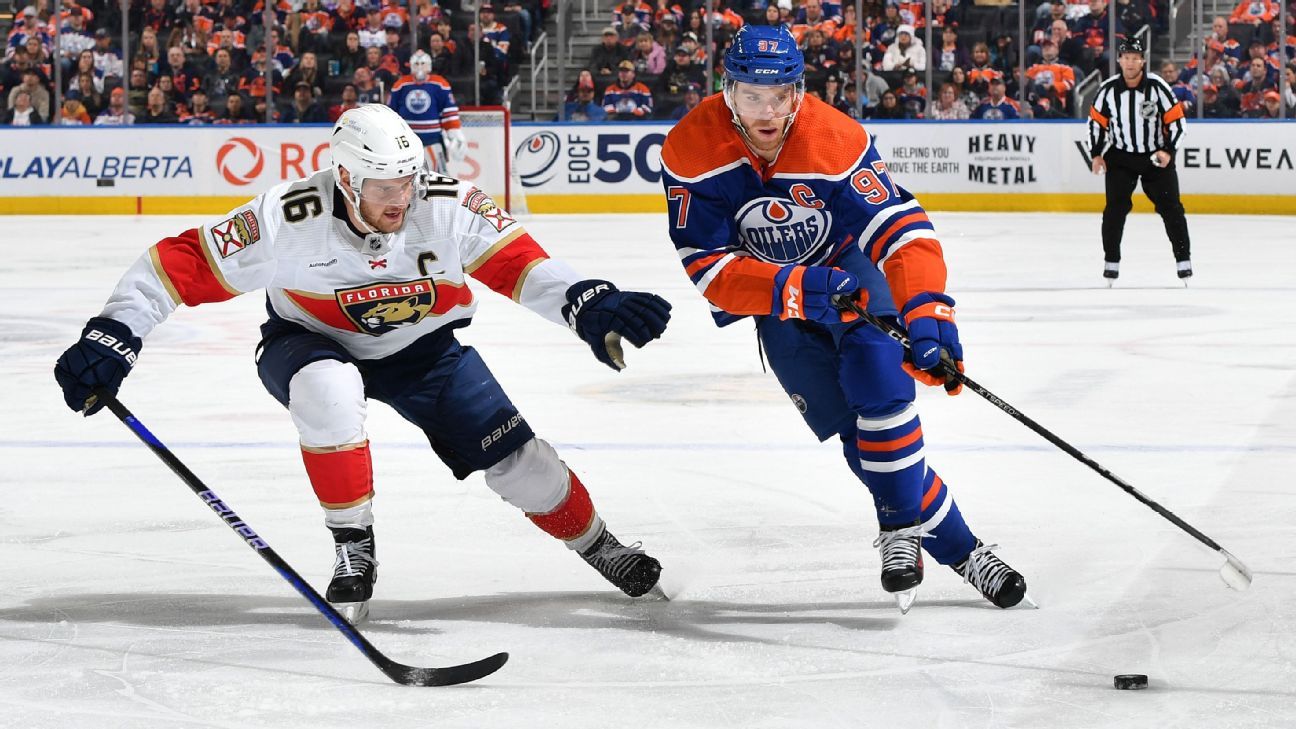“Everyone has a game plan for this young man. It’s not working. It’s not going to work for the rest of his career.”
That was Paul Maurice in 2016, then the head coach of the Winnipeg Jets, talking about Connor McDavid. Fast forward eight years and Maurice is readying his Florida Panthers for that exact task. For the first time, McDavid and Leon Draisaitl are playing in the Stanley Cup Final. Hockey fans have waited nearly a decade to watch the Edmonton Oilers‘ superstars on the biggest stage.
To be clear: This series isn’t about only them, but it is a unique opportunity for the league to have its best player in prime time. For our Cup finals preview, we look at key points of difference in the series, which team my model favors and why, along with a projection on the series result.
The model is a neural network that accounts for player strength; offensive, defensive and special teams performance; goaltending; matchup ratings; and rest. As the model ingests data, it improves, with the heaviest weights on recent play. The model allows for players to be added and removed, with their impact on the game results measured.
Here are the keys to Panthers-Oilers, with Game 1 on Saturday (8 p.m. ET on ABC/ESPN+).

Slowing down McDavid with depth
“You can’t play a one-on-one game with them. They’re just too fast, too strong, too skilled,” Maurice said this week.
Ask Miro Heiskanen about playing one-on-one against McDavid. Ask nearly every defenseman in the league, in fact, and they will agree with Maurice’s assessment. But Florida is the slight favorite in this series, and for good reason.
The Panthers’ second consecutive trip to the Cup Final has not been solely on the back of an elite goaltending performance from Sergei Bobrovsky. Florida has been the better team top to bottom in every series this spring. The Panthers defend well, keep pucks out of dangerous areas and are just as capable of beating teams in the alley as they are on the scoreboard.
Florida is the deeper team in this matchup, but it does not have the best player. It probably does not have the second-best player, either. But it does have nine of the top 15 players in the series, and that might be enough.
The Panthers are built for this
Florida GM Bill Zito and his staff have done a tremendous job building the Panthers. Sure, he inherited a perennial Selke Trophy contender in Sasha Barkov (who won the award this year, too).
More importantly (and in unique fashion), he made three trades for top-six players in Matthew Tkachuk, Sam Bennett and Sam Reinhart. Each of those players has been a key contributor to the Panthers’ success.
On the blue line, he brought in Gustav Forsling and Brandon Montour, the equivalent of pulling blackjack.
The move to hire Maurice was bold and not universally admired. But in two seasons as head coach, Maurice has two Cup Final appearances to his name. From top to bottom, Zito has hit all the right notes, and a second straight trip to the finals is more than deserved.
The special teams battle
Special teams can win or lose a series, and no team knows that better than the Oilers. Their combined special teams percentage is a whopping 131.2%, and they have not surrendered a goal while short-handed since Game 3 of the second round on May 12, a run of 28 consecutive penalty kills. In 18 playoff games, they have held opponents to three power-play goals.
The Oilers’ power play is humming along at 37.3% in the playoffs and will face its toughest test against Florida, a team with a penalty-kill success rate of 88.2% in the postseason. The Panthers pressure well in the neutral zone, attack in layers and have players capable of making quality reads to take away options.
The Oilers’ power play is unlike any other in the league. They don’t have just one or two primary weapons to cover. Each member of the top power-play unit is a threat to score, and if the Panthers cheat ever so slightly, the Oilers will make them pay. Edmonton’s special teams have been a difference-maker through the first three rounds. If that continues, the Oilers could find themselves atop the NHL mountain in a fortnight.
Barkov vs. McDavid: The Final’s main event
The most intriguing matchup of the series, without a doubt, is McDavid vs. Barkov. Barkov is elite on both sides of the puck. He drives play, stifles opponents and dominates the puck when he’s on the ice. McDavid, as Maurice noted, requires a five-man defensive unit. You cannot stop him; you simply must try to contain him.
If Barkov can limit McDavid’s impact — a feat no one else has been able to accomplish in 2024 — he will be a slam dunk choice for the Conn Smythe Trophy, because Florida will have won the Stanley Cup. The Oilers are not only McDavid and Draisaitl, but the matchup between the top two centers in the Final is pivotal to determining who comes out on top.
To shut down McDavid, Barkov will need to rely on his ability to anticipate, angle and communicate with teammates. No one can match McDavid’s speed; it simply isn’t done. However, if you get to McDavid before he hits his stride, alter his path and prevent him from being in full flight through the neutral zone, the backside pressure from the forwards will allow the defensemen to control the play more easily.
It is critical that Florida gets to McDavid and keeps him from gaining that speed, with the second layer of pressure impacting his path through the neutral zone. Forcing the puck out of McDavid’s hands in transition is the best way to contain him.
Barkov has shut down the likes of Nikita Kucherov, David Pastrnak and Artemi Panarin in these playoffs. The Oilers’ two-headed monster is a taller task. Say what you want about those other star players, they are tremendous talents. But McDavid and Draisaitl in the playoffs are on a different level. They are the final boss in the video game you played growing up. It will take a mammoth effort to keep those two under 1.5 points per game in this series, but if the Panthers can defend as a unit led by Barkov, they will be in good shape.
As always, there’s a real chance Connor McDavid will simply do Connor McDavid things, and no one has figured out how to stop that, yet.
Series prediction
The two best teams made the Cup Final. Dallas was deeper, but Edmonton’s superstars made up the difference. Neither the Panthers nor the Oilers lucked their way here, nor were they carried on the back of unsustainable goaltending. Both teams defend well, have very good or elite special teams and have players capable of turning a game on its head.
The thing about hockey is, if your top two centers and defensemen are better than your opponent’s, there is a very real chance you win. In the ultimate team sport, where margins are razor thin, sometimes the best players are the point of difference. The other thing about hockey is, when your goalie is better than your opponent’s goalie, you probably win.
There are many battles to watch for in this series, but odds are, one of those two narratives above will apply to whichever team lifts Lord Stanley’s Cup. Either way, one of two things will be true when all is said and done:
-
The deepest team, the one many believed was the best team all season, won the Cup.
-
Two of the sport’s best players, including this generation’s most talented player, carried their team to a Stanley Cup.
Everyone, their mother and their dog have the Panthers in this series. The books have it a lot closer than the hockey world does. The model has the Panthers as the slight favorite, with a 51.7% chance to win the series. It is a true toss-up. The series might be short in either direction, but it is unlikely to feature blowouts. There is a real possibility that every game in this series is a one-goal game, and a five-game series of one-goal games means that the losing team likely didn’t get as many bounces.
The post Projecting the matchups, tactics and X factors that will matter most in the Stanley Cup Final appeared first on Patabook Sports.

